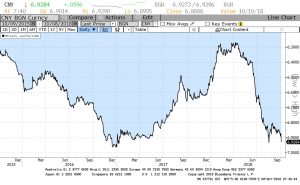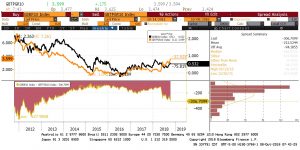Daily Comment (October 8, 2018)
by Bill O’Grady and Thomas Wash
[Posted: 9:30 AM EDT] It’s Monday—financial markets are in clear risk-off mode amid lots of news. It is Columbus Day, a bank holiday, so commercial banks and the Treasury market are closed today. Here is what we are following:
China: Chinese markets reopened after a week-long holiday to a significant drop in equity values and a drop in the CNY.

The exchange rate is testing recent lows as trade tensions rise with the U.S. There was an exchange between Chinese Foreign Minister Wang Yi and Secretary of State Mike Pompeo that has been described as “frosty”[1] during a five-hour visit by Pompeo to Beijing. China indicated that U.S. policy was “misguided.”[2] Tensions between the two countries are clearly rising. There was a near collision between Chinese and U.S. destroyers recently and the U.S. is considering increasing the number of Freedom of Navigation operations near outcroppings that China has been fortifying in recent years. Meanwhile, on trade, the U.S. doesn’t seem to be anywhere close to easing pressure on China; in fact, the long-term goal of the Trump administration appears to be shortening the supply chains,[3] with a focus on pulling productive capacity out of China. Part of China’s retaliation will be a weaker currency; we note that China lowered its reserve requirements in a bid to boost the economy.[4] We believe the CPC will do all it can to maintain high levels of economic growth as it views growth as legitimizing the rule of the party. Although the Chinese government tends to keep a lid on dissent, we do note there were riots over the holiday when a real estate developer cut prices in a bid to sell remaining units. The current property owners were furious and attacked the sales office, smashing windows.[5] Falling real estate values may be a more significant threat to the CPC than trade.
Brazilian elections: As expected, Jair Bolsonaro won a plurality on Sunday,[6] taking 46% of the vote, nearly winning a majority. There will be a runoff on the 28th which will likely make Bolsonaro the new president of Brazil. Bolsonaro is a right-wing populist whose platform is law and order and has shown an affinity for the military dictatorships of the early 1980s. Equity markets in Brazil have welcomed the outcome.
Italy: After agreeing on a budget last week, the EU criticized Italy’s rising deficits. This criticism prompted a strong reaction from the League’s deputy PM, Matteo Salvini, who suggested that “the enemies of Europe are those sealed in the bunker in Brussels.”[7] The exchange triggered another sell-off in Italian bonds and a drop in the EUR. As the chart below shows, the spread between German bunds and Italian 10-year sovereigns widened out over 300 bps, with Italian paper hitting a yield of 3.60% and German yields easing lower. Italy is a mortal threat to the Eurozone; if Italy leaves, it will severely damage the single currency to the point where it would probably not survive in its current form. We would expect other southern tier nations to exit the single currency if Italy leaves. If Germany wants to keep the Eurozone in place, it will be forced to ease its restrictions on fiscal spending and probably accept a Eurobond, a sovereign backed by the full faith and credit of all members in the Eurozone. Germany will see this as giving the Italians a credit card, leaving Germans to service the debt. Simply put, it is unlikely that Germany will accept this change. Thus, tensions will likely remain elevated.

The long arm of the authoritarians: Last week, we noted that Jamal Khashoggi, a Saudi journalist who had been critical of the Salman reign in Saudi Arabia, had gone missing after entering the Saudi embassy in Istanbul. He was recently living outside the kingdom on apparent fears of arrest and writing for the Washington Post.[8] Turkey claims that a Saudi unit tortured and killed Khashoggi last week.[9] The Saudis have denied the report. Separately, the head of Interpol, a Chinese national named Meng Hongwei, has resigned after he was arrested while visiting China last week.[10] Although two unrelated events, both indicate that authoritarian regimes, which generally won’t tolerate dissent, are signaling to their citizens that (a) you can’t run away, and (b) the West won’t protect you. If this message is true, it may stem capital flight which has boosted coastal real estate markets in the U.S. and Britain.
Oil prices: Oil prices have dipped on reports that the Trump administration is considering granting some waivers to nations wanting to import Iranian oil. That action may be necessary to contain the recent jump in oil prices. We will be watching to see if these waivers are permanent or if they need to be renewed after the midterm elections. If it’s the latter, we view this as a bid to lower oil prices in front of the midterms.
[1] https://www.ft.com/content/bb666e06-cad2-11e8-b276-b9069bde0956
[2] https://www.washingtonpost.com/world/china-tells-trump-administration-to-stop-its-misguided-actions-and-allegations/2018/10/08/cd17c926-cac1-11e8-a85c-0bbe30c19e8f_story.html?utm_term=.946be1214f51
[3] https://www.wsj.com/articles/u-s-tariffs-on-china-arent-a-short-term-strategy-1538841600
[4] https://www.marketwatch.com/discover?url=https%3A%2F%2Fwww.marketwatch.com%2Famp%2Fstory%2Fguid%2F8187f748-ca70-11e8-9cdc-8834b4cd15bb&link=sfmw_tw#https://www.marketwatch.com/amp/story/guid/8187f748-ca70-11e8-9cdc-8834b4cd15bb?mod=dist_amp_social
[5] https://twitter.com/polarmcbear/status/1048473629015465984?s=11
[6] https://www.ft.com/content/86a29826-cad1-11e8-9fe5-24ad351828ab
[7] https://www.ft.com/content/36abf528-cac3-11e8-b276-b9069bde0956
[8] https://www.washingtonpost.com/news/global-opinions/wp/2018/10/06/read-jamal-khashoggis-columns-for-the-washington-post/?utm_term=.ba113d6a41ef
[9] https://www.ft.com/content/d62a06ec-c9b7-11e8-b276-b9069bde0956?emailId=5bbae01f8faec70004dff956&segmentId=22011ee7-896a-8c4c-22a0-7603348b7f22
[10] https://www.ft.com/content/52edca9e-ca56-11e8-b276-b9069bde0956


